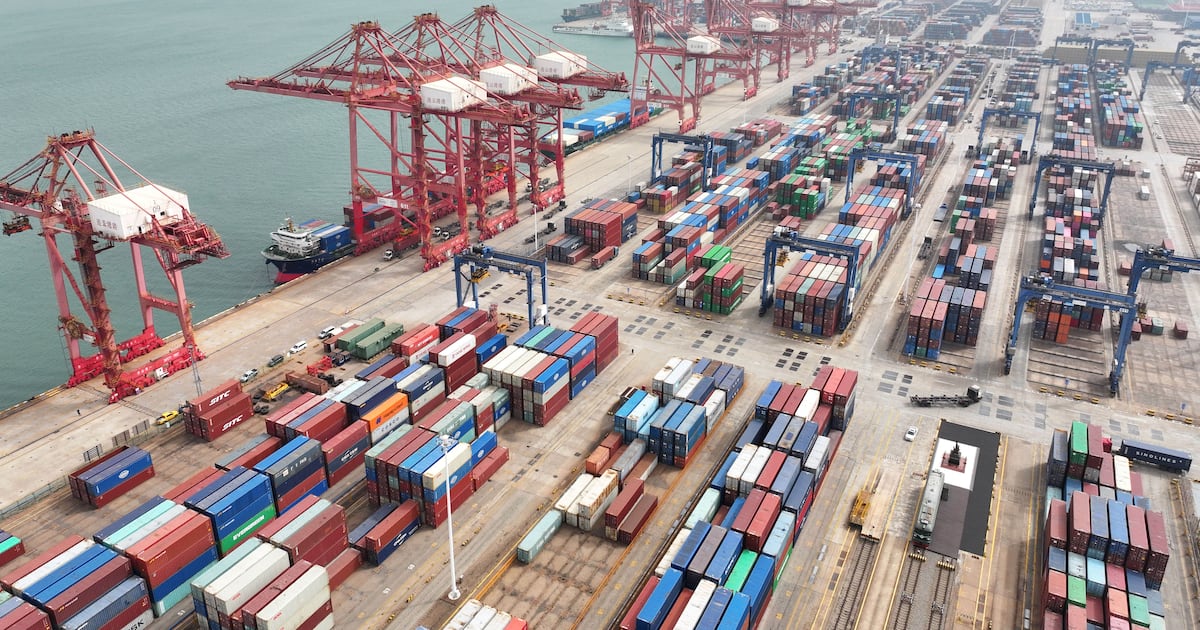
President Donald Trump said his tariffs may cause âtransition problemsâ but expressed confidence in his plan, after the White House clarified US tariffs on China rose to 145 percent.
âThereâll be a transition cost, and transition problems, but in the end itâs going to be a beautiful thing,â Trump said Thursday during a Cabinet meeting. âWeâre in very good shape.â
The staggering US tariffs on the worldâs second largest economy have triggered a tit-for-tat trade war that has unnerved global financial markets. Stocks fell on Thursday one day after the biggest buying spree in years. The S&P 500 Index sank more than 6 percent, before paring losses, as euphoria gave way to unease with investors bracing for more trade hostility.
Trump pointed to Wednesdayâs upswing after he announced a 90-day pause on higher tariffs on dozens of trading partners, saying âwe had a big day yesterday.â He later told reporters he had not seen Thursdayâs market numbers.
Treasury secretary Scott Bessent cited lower oil prices, a successful bond sale and better-than-expected inflation figures, while dismissing the significance of Thursdayâs selloff.
âLook, the up two down one is not a bad ratio,â Bessent said, adding that he did not âsee anything unusual today.â
Trump told a reporter he thought the first deals are âvery closeâ and voiced optimism that China would eventually come to the table. He also indicated willingness to be âflexibleâ on exemptions for companies or countries from the tariff regime, including on the 10 percent floor heâs established for all trading partners.
âSome countries, we have massive deficits with or they have big surpluses with us, and others is not that way â so it depends,â Trump said.
Still, Trump continued emphasise that he would reimpose substantial âreciprocalâ tariffs if satisfactory deals werenât struck over the next three months, and indicated heâd look to remove non-tariff barriers even with countries that had trade surpluses.
The Treasury and Commerce Departments, as well as the US Trade Representative, would be involved in the discussions in addition to Trump himself, Bessent said.
âWeâre putting a process in place,â Bessent told the president, later adding that âwe will end up in a place of great certainty over the next 90 days on tariffs.â
Commerce secretary Howard Lutnick said nations are making offers âthey never, ever, ever would have come with, but for the moves that the president has made.â
The tariffs are far above the level many economists said could decimate US-China trade, and the overall tariff level could send shockwaves through the economy. Even after Trumpâs pause, American average import taxes are still rising to a modern historic level of 24 percent, according to Bloomberg Economics.
Trump is imposing a 125 percent charge designed to both counter Americaâs trade deficit with China and punish Beijing for retaliating against US import taxes. The number, published in a White House memo Thursday, comes in addition to a 20 percent levy put into place earlier this year over Chinaâs role in fentanyl trafficking.
Other Chinese imports, such as materials used in solar panels, are already subject to import taxes.
Tariff Confusion
Trumpâs tariff rollout has been marked by confusion, as the president has repeatedly shifted course. Large placards with tariff rates displayed at the presidentâs Apr. 2 announcement were inconsistent with numbers the White House published in its official order, and the formal rates were later changed to reflect the figures on the posters.
The president on Wednesday abruptly announced plans to put off higher levies on dozens of nations hours after they went into place, following a bond-market rout, even as he escalated his trade fight with Beijing.
The USâs other trading partners will face a 10 percent blanket import tax to allow time period to negotiate individual trade agreements. If that doesnât succeed, the higher duties are set to go into place on July 9.
The presidentâs order published Thursday also raised duties even further on small packages from China that were previously not taxed, which could hit American shoppers purchasing goods from retailers like Temu and SheIn Group Ltd.
By Josh Wingrove
Learn more:
Fashion Stocks Soar After Trump Pauses Tariffs on All Countries But China
The US will temporarily impose a universal 10 percent tariff instead of the higher levies announced last week, but duties on China will climb to 125 percent.

